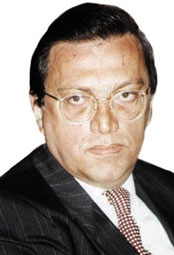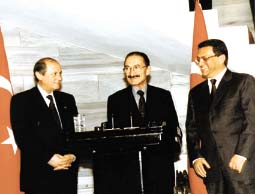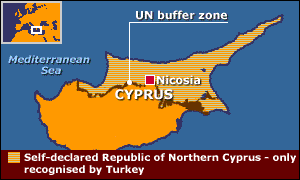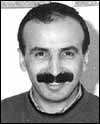11
September 2002
![]()
2. "Turkish government in chaos ahead of November elections", Turkey's embattled government coalition sailed into a new storm on Tuesday, less than two months ahead of general elections, after one of its partners called on Prime Minister Bulent Ecevit to resign. But Ecevit swiftly rebuffed the call by his centre-right partner and Deputy Prime Minister Mesut Yilmaz, saying he would continue in office until the elections on November 3.
3. "Doubts Linger Over Turkey's EU Deadline", the Turkish government is downcast by the prospect of missing a self-imposed year-end date for the start of European Union membership talks after it passed a raft of ambitious EU-demanded reforms aimed at eventual membership in the bloc. Notwithstanding Ankara's grumbling over what it sees as a double standard for NATO's only Muslim member, the EU says reforms, although encouraging, do not by themselves warrant the start of talks at a summit in Copenhagen in December.
5. "Turkey sends troops into north Iraq", Turkey has sent 1,000 more troops to Iraq's breakaway Kurdish north, bringing the total to 5,000, a Turkish military official says, as speculation mounts over possible U.S. military action against Iraq.
6. "Karasu: The only chance is the leftist block", Mustafa Karasu, member of KADEK Council of Leaders, stated that the Democracy Block consisting of HADEP, SDP. EMEP and DEHAP had the opportunity to create a democratic Turkey, saying "We see the leftist block as the most important incident in the Turkish history and attribute it a historical meaning."
1. - Reuters - "Turkish government rocked by EU row":
ANKARA / 10 September 2002
Deputy prime minister Mesut Yilmaz said on Tuesday that Turkey needed
an interim government that would see through key EU reforms, signalling
he could quit the three-party coalition ahead of a November election.
Turkish Prime Minister Bulent Ecevit struggled earlier in the day to quell the explosive dispute that stoked market fears of political turmoil scotching snap polls.
The row between Yilmaz and the Nationalist Action Party (MHP) only added to the agony of a country fearful over possible U.S. action in neighbouring Iraq and of deeper economic woes.
Markets see polls as essential to establishing a stable government capable of seeing through multibillion-dollar IMF reforms, slashing interest rates and coping with Turkey's huge debt burden. NATO allies see elections in Turkey as a means to end bickering that has hampered government.
Yilmaz, facing a possible electoral debacle, lashed out at a legal move by the MHP to annul human rights legislation approved in pursuit of European Union entry talks.
"It is apparent that a government with the Nationalist Action Party will get nowhere on the European Union issue," Yilmaz told reporters at a news conference.
"It is essential an interim government be established ... that will both take Turkey to early elections and will carry out efforts to harmonise with the European Union," he said.
Yilmaz called on the MHP to step aside. If it refuses, he said: "This government should be toppled and a new one that supports the European Union issue be formed."
Stocks on the Istanbul exchange slumped four percent and the lira currency fell sharply in the afternoon.
"For a market that was already tense enough with Iraq and a lack of clear expectations, that was essentially rubbing salt in the wound," said Niyazi Atasoy of Ata Investment in Istanbul.
Many fear Yilmaz's implicit threat to bring down the government heralded a broader attempt to rally support for postponement of the elections by parliamentary vote.
MHP leader Devlet Bahceli made it clear even before Yilmaz's statement he had no intention of going.
"This government should take our country to elections on November 3," Bahceli told reporters. "A goal such as toppling the government, putting another government in (its) place will throw Turkey into a serious degree of chaos."
Surveys show several parties, including Motherland, may fail to clear the 10 percent barrier to enter the next parliament.
Furthermore, a groundswell of support for delay could emerge on Wednesday from those deputies dropped from candidate lists submitted by parties to the electoral board.
The Justice and Development Party (AKP), viewed by the army and others with suspicion for its Islamist roots, is well ahead of all rivals in polls and could well form the next government.
"This...is an attempt by Yilmaz to escape from elections, and we think it is ugly," AKP deputy chairman Mehmet Ali Sahin told private NTV television.
The influential armed forces have said any postponement of the polls could pitch Turkey, a country set between the Balkans and the turbulent Middle East, into chaos.
Asked if efforts could be under way to postpone polls,
Motherland deputy Bulent Akarcali replied: "Sure, sure. Not by his (Yilmaz's) initiative but as a reaction to MHP hypocrisy."
Ecevit, whose illness earlier this year stirred conflict in the coalition and led to the calling of early elections, responded angrily to Yilmaz at a news conference.
"Turkey is going through a very sensitive period," he said. "Early polls will be held in a few months...in such a situation we cannot take responsibility for a change of government."
He said there was nothing extraordinary about the MHP appealing to the constitutional court to annul the rights amendments, including an easing of language restrictions for Kurds and abolition of the death penalty in peacetime.
"Mesut Yilmaz made a big issue out of it," Ecevit said.
The government, in any case, emerged from the day looking vulnerable even in its role as caretaker before elections.
The bitterness in the three-year-old coalition runs deep.
A top MHP figure said he would file a legal petition against Ecevit, accusing him of allowing Kurdish rebel chief Abdullah Ocalan to run his banned organisation from a prison cell.
Ocalan led the Kurdistan Workers Party (PKK) in a bloody campaign for an ethnic homeland, which killed more than 30,000 since it began in 1984. He was captured after an international manhunt in 1999 and sentenced to death, but stands to benefit from a recent law ending capital punishment in peacetime.
He has occasionally issued statements through lawyers.
![]()
2. - AFP - "Turkish government in chaos ahead of November elections":
ANKARA / 10 September 2002 / by Hande Culpan
Turkey's embattled government coalition sailed into a new storm
on Tuesday, less than two months ahead of general elections, after one
of its partners called on Prime Minister Bulent Ecevit to resign. But
Ecevit swiftly rebuffed the call by his centre-right partner and Deputy
Prime Minister Mesut Yilmaz, saying he would continue in office until
the elections on November 3.
"It is not rational or reasonable to ask for a government change when there is only a short time before elections," Ecevit told a press conference after meeting senior members of his Democratic Left Party (DSP). "Others can topple us (by a censure motion), but we cannot take the responsibility for (withdrawing)," he said, adding that such a change would have dire consequences for the economy, already deep in crisis. Following Ecevit's refusal to quit, Yilmaz said his Motherland Party (ANAP) would decide Wednesday whether it would itself leave the government. "We will evaluate our position this evening. Tomorrow we will outline our stance on whether we stay in the government or not," Yilmaz told reporters.
ANAP's withdrawal from the government would deliver a heavy blow to the embattled coalition, which lost its parliamentary majority after more than 60 MPs resigned in July. Tuesday's crisis came after Yilmaz said he doubted the government could survive until the elections because of a move by the far-right Nationalist Action Party (MHP), the ruling coalition's third partner, to challenge recently-adopted democratic reforms before the country's constitutional court. These include a repeal of the death penalty and legalisation of the teaching of the Kurdish language.
"I have serious doubts as to whether the current government can stay in office even as a caretaker government after the move by the MHP," Yilmaz told a press conference. Yilmaz then demanded Ecevit's resignation. A collapse of the government could force parliament back from recess and a simple majority of deputies could then vote to postpone the election. The MHP, meanwhile, lashed out at Yilmaz, accusing him of trying to postpone the November elections, in which many parties, including ANAP, risk being eliminated from parliament if they fail to clear a 10-percent national electoral threshold.
"Everyone knows there is a movement to break up the government and force the postponement of polls in Turkey," MHP deputy chairman Sevket Bulent Yahnici told NTV. Speculation has long been rife that parties which risk being left out of the next parliament, as well as MPs excluded from candidate lists, might seek to cancel the election. The political upheveal took its toll on the Istanbul stock exchange, sending shares down 4.16 percent, or 391.1 points, to close the day at 9,008.2 points.
Yields on the most heavily traded bonds rose more than
two percentage points and the already weak Turkish currency lost ground
against the dollar. Turkish markets see elections as the way out of
the current political uncertainty triggered by Ecevit's ill health and
a government dispute over reforms needed to help the country's bid to
join the EU. The subsequent government turmoil led to a parliamentary
decision to bring elections forward from April 2004. ![]()
3. - The Oxford Business Group - "Doubts Linger Over Turkey's EU Deadline":
10 September 2002
The Turkish government is downcast by the prospect of missing a
self-imposed year-end date for the start of European Union membership
talks after it passed a raft of ambitious EU-demanded reforms aimed
at eventual membership in the bloc. Notwithstanding Ankara's grumbling
over what it sees as a double standard for NATO's only Muslim member,
the EU says reforms, although encouraging, do not by themselves warrant
the start of talks at a summit in Copenhagen in December.
The EU commissioner for enlargement, Guenter Verheugen, said reforms passed by parliament last month, which included abolition of the death penalty and the granting of greater cultural rights to the country's Kurdish minority, were "encouraging," but warned that the laws had to be properly instituted. "Turkey has started to move in the right direction... But it will not hide the fact that we need to see proper implementation. We need to see secondary legislation that applies the changes of the constitution, therefore I do not believe that we will have a track record before the end of the year which is sufficient to make a final judgement," Verheugen told reporters on August 30th after an informal meeting of EU foreign ministers.
Turkish officials maintain that Ankara's place in Brussels' expansion plans should be ensured with the passing of the reforms. Speaking on September 2nd on the NTV television network, Turkish Foreign Minister Sukru Gurel said Verheugen's comments were poorly timed. "Turkey has done everything it could do, if not more." President Ahmet Necdet Sezer, speaking on September 2nd from Johannesburg where he was attending a United Nations conference on sustainable development, suggested Ankara's candidacy was being unfairly influenced by Verheugen. "[Verheugen] cannot talk on behalf of 15 EU member countries. He cannot direct the EU's position."
A commission formed to craft guidelines of EU-related laws on the use of minority languages and the purchase of land by minority foundations met for the first time on September 3rd. State Minister Ali Dogan, who sits on the commission along with the justice and interior ministers, suggested after the meeting that Ankara would try to beat the clock on the start to talks. "Even though a period of one year is foreseen for these laws, we are required to make these arrangements as soon as possible." Speed is of the essence, ahead of a report on candidate countries' progress due in the middle of October. The list of countries with whom the EU will begin talks will be announced in Copenhagen in December.
Weeks of division in the left-right coalition over the reforms had threatened to add to prevailing political uncertainty and wreck $16bn in stabilisation funds backed by the International Monetary Fund (IMF). The sense of urgency and entitlement with which Turkish politicians regard EU membership talks was expressed clearly by Prime Minister Bulent Ecevit after the vote. "Turkey is waiting for full membership in the shortest time. Full EU membership is our right... Turkey is already freer, more democratic, more European." The country's mainstream dailies reported the changes in similar language, heralding the vote as historic.
However, Cyprus remains a significant bump in the road to Brussels that will no likely be removed by decisive legislation of the kind witnessed in early August. Turkey is against Cyprus' accession to the EU as a divided island and dismisses any suggestion that Ankara's bid should be contingent on resolution of the Cyprus issue. "Some circles have been trying to connect the EU and Cyprus question. The Cyprus question is not regarded with the Copenhagen criteria and EU full membership. The Cyprus question should be resolved by the Turkish Cypriot side and the Greek Cypriot side," Ecevit said on September 3rd.
Central to Turkey's EU bid is the loosening of laws that
regularly land politicians and intellectuals in prison for undermining
the integrity of the state, under controversial Aricle 312 of the constitution.
Tayyip Erdogan, the leader of the Justice and Development Party (AKP),
served time in prison after being sentenced for incendiary remarks,
and he faced a political ban based on his conviction. But on September
6th, an appeals court overturned a ruling by a lower court enforcing
the ban. Erdogan's lawyers had argued that 312, included in the package
of EU reforms, had been amended according to EU standards, and therefore
was no longer applicable. Erdogan and his conservative AKP, eyed warily
by the country's secular establishment, are the frontrunners in the
race to win the November elections. ![]()
4. - AFP - "EU enlargement envoy hopes for last-minute deal on Cyprus":
BRUSSELS / by Michael Thurston / 10 September 2002
The European Union expressed hope Tuesday for a last-ditch deal
on the divided island of Cyprus before a December deadline for a decision
on allowing it to join. EU enlargement commissioner Guenter Verheugen
said he hoped Turkish elections in November could help unblock the decades-old
dispute over the island, divided between Turkish and Greek Cypriots.
"It is late but not too late," he told the European parliament, setting out the latest plans to expand the 15-member bloc with 10 new countries by 2004. "We are of course concerned by the fact that time is moving on so quickly but there is still a chance of achieving a political solution before accession," he said. The Mediterranean island has been divided since Turkey invaded its northern third in 1974 in response to an Athens-engineered coup aimed at uniting the island with Greece.
The stalemate in resolving the dispute has become an issue of pressing concern, since the island is slated for a first-round 2004 entry into the European Union. The commissioner reiterated assurances that the EU would not allow settlement of the island's 28-year-old division to become a precondition for membership. But Brussels would clearly rather admit a country which is not split down the middle. "We need a Cyprus which speaks with one voice with the European Union," he said. The other nine countries hoping for an EU greenlight in December are: the Czech Republic, Estonia, Slovakia, Hungary, Latvia, Lithuania, Malta, Poland and Slovenia. Two other countries, Romania and Bulgaria, are well behind in their economic development and reform but would like to join the EU by 2007.
Setting out the EU's timetable for the home straight of entry negotiations with the 10 mostly ex-communist countries, Verheugen said that November 3 elections in Turkey could finally change the climate. "I would welcome it if following the Turkish elections there was clear progress made on the issue of Cyprus," he said. "We express the hope that in the November elections a government will be elected that is stable, democratic, reformist and pro-European." The European Commission, the EU's executive arm, will publish reports on all candidate states on October 16. "But we are not going to pre-empt any political decision," Verheugen said. The final decision on which countries will be admitted to the EU will be taken at a mid-December EU summit in Copenhagen. Cyprus's EU hopes were given a small knock at the weekend when Greek Prime Minister Costas Simitis said Turkey had built a "negative climate" around the issue.
"The environment today is such that Cyprus's accession,
which until now has advanced perfectly normally, may run into difficulties,"
he said. Turkey's accession to the EU is considered the most problematic
of all. While officially a candidate, it has not been allowed to begin
EU membership negotiations. One major obstacle was lifted this summer
when Ankara adopted a series of reforms demanded by the EU, including
abolition of the death penalty and increased cultural rights for the
large Kurdish minority. But diplomats say it remains unlikely that Turkey
will be granted the start date it has requested for membership talks
at the Copenhagen summit. "Turkey should be praised where that
is warranted. But secondary legislation still has to be passed, and
some of the reforms remain to be implemented," Verheugen said.
![]()
5. - Reuters - "Turkey sends troops into north Iraq":
TUNCELI / 11 September 2002 / by Ferit Demir
Turkey has sent 1,000 more troops to Iraq's breakaway Kurdish north,
bringing the total to 5,000, a Turkish military official says, as speculation
mounts over possible U.S. military action against Iraq.
Turkey regularly pursues the Turkish Kurdistan Workers Party (PKK) into northern Iraq, outside of Baghdad's control since the end of the Gulf War.
"The soldiers are in the region with the aim of watching and controlling the activities of PKK militants," the official said on Tuesday.
"Separately, Turkey is ensuring the peace and security of the local people in northern Iraq with this military force and is providing stability in the region," he said.
Ankara and Iraqi Kurds have traded barbs in recent weeks over fears Turkey could intervene to block the Kurds from setting up an independent state in the enclave they have administered since rising up against Iraqi President Saddam Hussein in 1991.
Iraqi Kurdish leaders have said their aim is not statehood, insisting they want a united, federal Iraq in the aftermath of any U.S. military offensive to topple Saddam.
The Turkish official denied the deployment of 1,000 troops near the town of Kani Masi across Turkey's southeastern border had stoked tension with the regional authority, the Kurdistan Democratic Party (KDP), which jointly runs the enclave.
While warning Turkey not to resort to threats to solve problems, KDP leader Massoud Barzani sought on Tuesday to ease tension with Ankara by saying his recent remarks that appeared in a German newspaper had been distorted.
Die Zeit newspaper last week quoted Barzani as saying Iraqi Kurds would launch an "intifada (that) would turn our streets into a graveyard for Turkish soldiers."
Turkey has allowed the United States to use its air bases to patrol a "no-fly" zone over northern Iraq that protects the Kurds from any reprisals from Baghdad.
Both sides would be key allies if U.S. President George W. Bush decides to strike Iraq for its alleged development of weapons of mass destruction.
PKK guerrillas, part of an armed movement that aims to
carve out an ethnic homeland in southeastern Turkey, largely withdrew
into Iraq after their commander was captured in 1999. ![]()
6. - Kurdish Observer - "Karasu: The only chance is the leftist block":
Mustafa Karasu, member of KADEK Council of Leaders, stated that the Democracy Block consisting of HADEP, SDP. EMEP and DEHAP had the opportunity to create a democratic Turkey, saying "We see the leftist block as the most important incident in the Turkish history and attribute it a historical meaning."
FRANKFURT/MHA / 10 September 
Participated by telephone in the "Acilim" program on MEDYA
TV and commented on the latest political developments, Mustafa Karasu,
member of KADEK Council of Leaders, called on everybody to form a powerful
leftist-democratic block in November 3 elections. The Kurdish leader
pointed out that ODP and SHP should participate in the block too, drawing
attention that small problems should not be exaggerated. Calling on
the Alaouite sections, Karasu asked for them to vote for the block.
Karasu stressed that the block would play a historical role in forming
a Turkish-Kurdish alliance, having this to say: "There had been
a struggle for democracy for 40 years. Past 30 years has witnessed a
democratic struggle of the Kurdish people. But there has been no opportunity
to create a democratic Turkey. Now it represents itself. And it means
a democratic unity."
Karasu continued to say the following: "On August 2 abolishing capital punishment was of historical importance. It was important to abolish the method of massacre inherited from Ottoman. On the other hand a democratic power is needed to reinforce the steps taken for Kurdish publication and broadcasting. Such a parliament strengthens Turkey. Therefore we believe that the block would make the parliament stronger and give it a democratic content. The block will be like fresh air versus political corruption."
Karasu emphasized that the block could exceed the electoral threshold even as it were, asking for peace defenders and all minorities to support it.
CHP CANNOT MEET THE DEMANDS OF TOILING MASSES"
Reminding that CHP had not a consistent democratic discourse,
Karasu said that CHP could not meet the demands of toiling masses. The
Kurdish leader said with words to the effect: "CHP does not defend
real democracy. Even if its name is left, its stance is not democratic.
It does not have an approach which can develop the unity of Turkish
and Kurdish peoples. As they do not defend a democratic Turkey, they
cannot meet the demands of toilers." ![]()